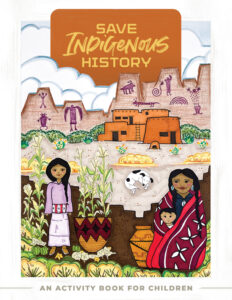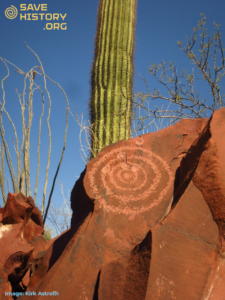What Is Save History & the ARPA Assistance Initiative?
The Bureau of Indian Affairs and Archaeology Southwest are partners in a multi-year Cooperative Ecosystem Studies Unit (CESU) agreement to provide Archaeological Resources Protection Act (ARPA) assistance. 
Our team collaborates with Tribes to prevent, detect, and respond to archaeological resource crimes. We create educational resources for practitioners and the public, facilitate ARPA training events, and help remediate archaeological sites damaged by looting and vandalism. Our website, SaveHistory.org, fosters public awareness by offering educational resources and provides a confidential crime-reporting mechanism for the public.
We provide these resources at no cost to Tribal Nations. Please email arpa@archaeologysouthwest.org to submit a request.
Mission
To eliminate archaeological resource crimes from all Tribal lands.
Goals
![]()
Prevent archaeological resource crime through education and public awareness that centers Tribal perspectives on the value of heritage sites
![]()
Detect archaeological resource crimes through monitoring, reporting by community members, and emerging technologies
![]()
Respond to reported crimes by coordinating investigations with a network of trained professionals, including archaeologists and law enforcement
![]()
Restore damaged sites to aid in remediation, healing in Tribal communities, and stewardship enactment
![]()
Build capacity and collaborate with Tribes to protect and restore sites, support ARPA response networks, and develop strategies to prevent and address archaeological resource crimes in culturally appropriate ways
What We Offer for Historic Preservation Offices and Law Enforcement
- A menu of services, including the following:
- Customizable ARPA training courses for Tribal cultural resources staff, archaeologists, and law enforcement on how to conduct ARPA damage assessments and investigations
- Investigation support, including personnel, equipment, and assistance with ARPA Damage Assessments
- Tools to protect and monitor sites, including no-trespassing signs, surveillance cameras, and fencing materials
- Templates for Tribal cultural resource protection laws
- Restoration support and training to remediate damage at archaeological sites
- Backfilling looters’ holes
- Graffiti cleanup on rock imagery panels
Public Awareness, Outreach, & Education
- Customizable cultural resource awareness trainings to promote citizen stewardship
- Respecting Archaeological Sites presentation/activity for grades 3–12
Literature
- For parents, educators, and teachers: download our free Save Indigenous History: An Activity Book for Children (grades 3–5) and Save Indigenous History – Yakama Nation Collaboration (grades 3–5).

- For archaeologists, read our open-access article on cultural resource damage assessment.
- Learn more about archaeological resource crime with our fact sheet.
- For archaeologists, cultural resource specialists and law enforcement: Please contact us at arpa@archaeologysouthwest.org for a list of available resources for professionals who investigate cultural resource crimes.
What to Do If You Find Evidence of a Crime

Vandals desecrate these vulnerable sites with spray-painted, carved, and scratched graffiti. Target shooters may destroy them with bullet holes. Looters use power tools to steal whole panels, and sometimes even steal entire boulders for personal gain.
If you encounter damage at a recently looted or vandalized site, please take a few quick photographs and, if possible, record GPS coordinates. Remember that this is a crime scene—leave the area as you found it so law enforcement can assess the scene accurately. Never confront someone in the act of looting or vandalizing. Move to a safe place and call local authorities.